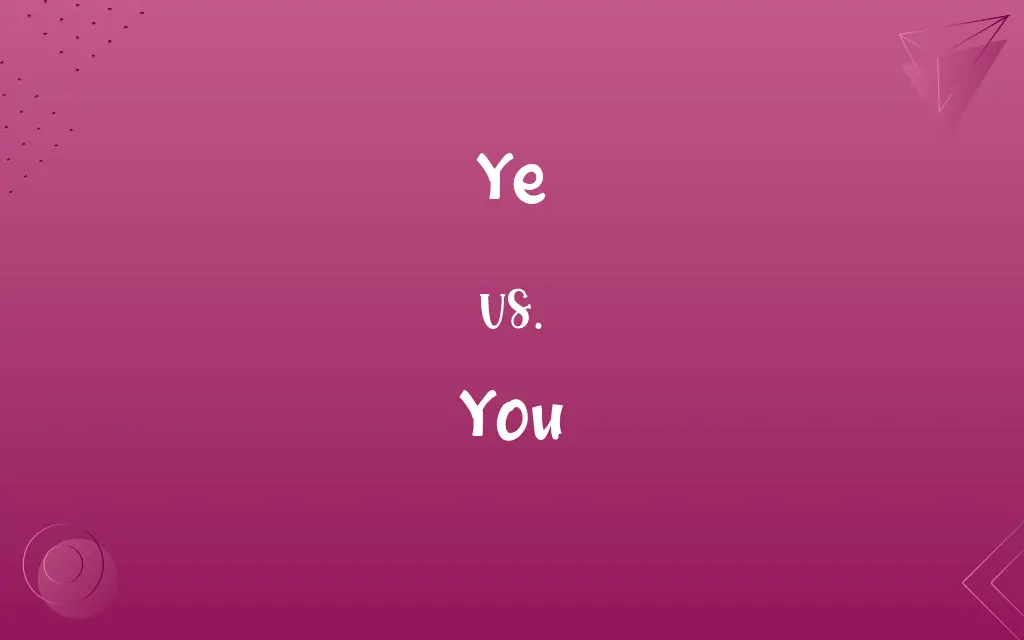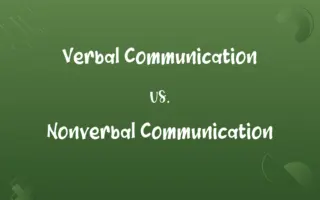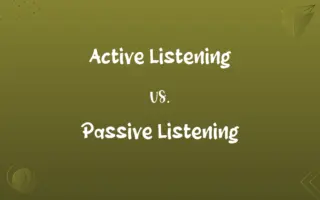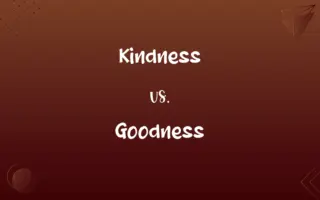Ye vs. You: Know the Difference

By Shumaila Saeed || Updated on December 25, 2023
"Ye" is an archaic or dialectal form of "you," used historically for the plural, while "you" is the modern English pronoun for both singular and plural second-person.

Key Differences
"Ye" is an old English pronoun, historically used as a plural form of "thou" (the singular second-person pronoun), mainly in formal or poetic contexts. "You" is the contemporary English pronoun used for both singular and plural second-person forms in all contexts.
Shumaila Saeed
Nov 28, 2023
In historical usage, "ye" was used to address groups or individuals formally, reflecting a distinction that no longer exists in modern English. "You," on the other hand, is universally used in current English for addressing both individuals and groups, without formal distinction.
Shumaila Saeed
Nov 28, 2023
The use of "ye" is now mostly limited to archaic, religious, or literary texts, and it is rarely used in everyday conversation. "You" is one of the most commonly used pronouns in modern English, essential for daily communication.
Shumaila Saeed
Nov 28, 2023
"Ye" can sometimes be seen in historical or stylistic writing to evoke a sense of antiquity or formality. In contrast, "you" is neutral, fitting into any contemporary context, whether formal or informal.
Shumaila Saeed
Nov 28, 2023
The pronunciation of "ye" historically varied, often pronounced as "thee" or "yee." "You" has a consistent pronunciation in modern English, recognized and used globally.
Shumaila Saeed
Nov 28, 2023
ADVERTISEMENT
Comparison Chart
Frequency of Use
Rare, mostly in specific contexts
Extremely common in everyday use
Shumaila Saeed
Nov 28, 2023
ADVERTISEMENT
Ye and You Definitions
You
Refers to the person being spoken or written to.
You have won the prize!
Shumaila Saeed
Nov 28, 2023
Ye
An archaic plural form of 'you.'
Hear ye, hear ye, the court is now in session.
Shumaila Saeed
Nov 28, 2023
You
The second-person pronoun, both singular and plural.
You are my best friend.
Shumaila Saeed
Nov 28, 2023
Ye
An older form of the second-person plural pronoun.
Ye have been warned of the dangers.
Shumaila Saeed
Nov 28, 2023
ADVERTISEMENT
You
Employed to address more than one person.
Are you all coming to the party?
Shumaila Saeed
Nov 28, 2023
Ye
Found in religious or classical texts as a form of 'you.'
Blessed are ye who enter here.
Shumaila Saeed
Nov 28, 2023
Ye
Used historically for addressing a group.
Ye are all invited to the royal feast.
Shumaila Saeed
Nov 28, 2023
You
A universally recognized pronoun in modern English.
You need to see this!
Shumaila Saeed
Nov 28, 2023
You
(object pronoun) The people spoken, or written to, as an object.
Both of you should get ready now.
Shumaila Saeed
Oct 19, 2023
You
(object pronoun) The person spoken to or written to, as an object. (Replacing thee; originally as a mark of respect.)
Shumaila Saeed
Oct 19, 2023
Ye
The Cyrillic letter Е, е, featured in various Slavic and Turkic languages.
Shumaila Saeed
Oct 19, 2023
You
(subject pronoun) The people spoken to or written to, as a subject. (Replacing ye.)
You are all supposed to do as I tell you.
Shumaila Saeed
Oct 19, 2023
You
(subject pronoun) The person spoken to or written to, as a subject. (Originally as a mark of respect.)
Shumaila Saeed
Oct 19, 2023
Ye
The plural of the pronoun of the second person in the nominative case.
Ye ben to me right welcome heartily.
But ye are washed, but ye are sanctified.
This would cost you your life in case ye were a man.
Vain pomp and glory of this world, I hate ye.
I come, kind gentlemen, strange news to tell ye.
Shumaila Saeed
Oct 19, 2023
You
(indefinite personal pronoun) Anyone, one; an unspecified individual or group of individuals (as subject or object).
Shumaila Saeed
Oct 19, 2023
You
The individual or group spoken or written to.
Have you gentlemen come to see the lady who fell backwards off a bus?
Shumaila Saeed
Oct 19, 2023
You
Used before epithets, describing the person being addressed, for emphasis.
You idiot!
Shumaila Saeed
Oct 19, 2023
You
(transitive) To address (a person) using the pronoun you (in the past, especially to use you rather than thou, when you was considered more formal).
Shumaila Saeed
Oct 19, 2023
You
The pronoun of the second person, in the nominative, dative, and objective case, indicating the person or persons addressed. See the Note under Ye.
Ye go to Canterbury; God you speed.
Good sir, I do in friendship counsel youTo leave this place.
In vain you tell your parting loverYou wish fair winds may waft him over.
Shumaila Saeed
Oct 19, 2023
Repeatedly Asked Queries
Does "ye" have a different meaning in religious texts?
Its meaning as a second-person pronoun is the same, but it carries an archaic tone.
Shumaila Saeed
Nov 28, 2023
Can "you" be used for both singular and plural?
Yes, "you" is used for both singular and plural second-person forms.
Shumaila Saeed
Nov 28, 2023
Is "ye" still used in modern English?
Rarely, mostly in historical, religious, or literary contexts.
Shumaila Saeed
Nov 28, 2023
Was "ye" ever pronounced as "thee"?
Historically, yes, especially in certain dialects.
Shumaila Saeed
Nov 28, 2023
Is "you" the only second-person pronoun in modern English?
Yes, it's used universally for both singular and plural.
Shumaila Saeed
Nov 28, 2023
Are there contexts where "ye" is still appropriate?
Primarily in historical reenactments, religious ceremonies, or literary works.
Shumaila Saeed
Nov 28, 2023
Why is "ye" rarely used today?
Modern English has evolved, dropping the distinction between singular and plural second-person pronouns.
Shumaila Saeed
Nov 28, 2023
Is the use of "you" consistent in English dialects?
Yes, it's universally understood and used in all English dialects.
Shumaila Saeed
Nov 28, 2023
How do speakers distinguish singular and plural "you"?
Contextually, or with phrases like "you all" or "you guys" for clarity.
Shumaila Saeed
Nov 28, 2023
Why did "ye" fall out of use?
Language evolution and the simplification of pronoun use in English.
Shumaila Saeed
Nov 28, 2023
Does "ye" have different forms?
Not in modern usage; it's mainly fixed in its historical form.
Shumaila Saeed
Nov 28, 2023
Can "ye" be used in contemporary writing?
Yes, but usually for stylistic or historical effect.
Shumaila Saeed
Nov 28, 2023
Can "you" be ambiguous in number?
It can be, but context usually clarifies the intended number.
Shumaila Saeed
Nov 28, 2023
Is "you" always direct address?
Mostly, though it can be used in general statements.
Shumaila Saeed
Nov 28, 2023
Are there modern equivalents to "ye"?
Not exactly; modern English uses "you" for both singular and plural.
Shumaila Saeed
Nov 28, 2023
How is "you" taught to English learners?
As the standard second-person pronoun for all contexts.
Shumaila Saeed
Nov 28, 2023
Does "you" have an equivalent in other languages?
Most languages have an equivalent second-person pronoun, though the singular/plural distinction varies.
Shumaila Saeed
Nov 28, 2023
Can "you" be impersonal?
Yes, it's sometimes used impersonally, as in "you never know."
Shumaila Saeed
Nov 28, 2023
Is "ye" considered formal?
Historically, it was formal, especially compared to "thou."
Shumaila Saeed
Nov 28, 2023
Share this page
Link for your blog / website
HTML
Link to share via messenger
About Author
Written by
Shumaila SaeedShumaila Saeed, an expert content creator with 6 years of experience, specializes in distilling complex topics into easily digestible comparisons, shining a light on the nuances that both inform and educate readers with clarity and accuracy.






































































